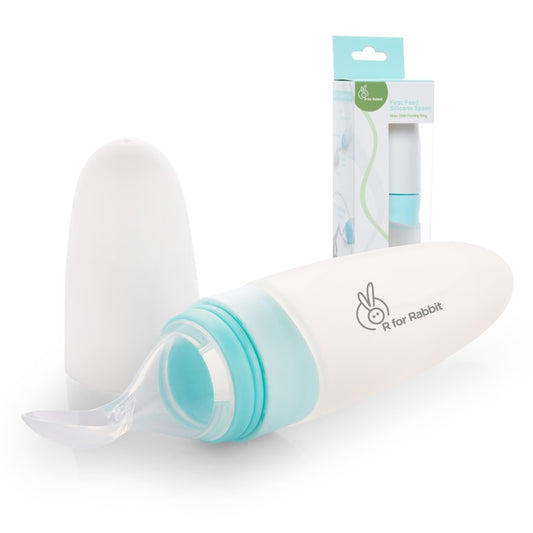How to Sterilize Baby Feeding Spoons and Ensure Complete Hygiene?

You will go through hard times and important turning points as a parent. Keeping your child safe should always take precedence along with enjoying their development journey.
Use only ripe fruits and vegetables for the first mush your baby eats. Now, you are eager to observe their reaction to a tablespoon. In the excitement of this important event, have you considered how to sterilize baby feeding spoons? Cleaning baby feeding spoons are essential to infant health, although they may not be your first thought.
Baby feeding spoons are more susceptible to germs and diseases in the first several months. Germs and pests in dirty baby feeding spoons might harm your kid. Dirty items can harbour E. coli and Salmonella, harming your baby's digestive system.
Sterilizing and Cleanliness of Baby Spoons
Sterilizing baby feeding spoons requires more than cleanliness. Keeping your baby healthy and giving them the greatest start matters. It eliminates harmful bacteria and reduces the incidence of infections and diseases. It will help your baby grow without health issues.
This article explains why baby feeding spoons should be precisely cleaned, especially in the first few months. We will discuss sterilization methods, hygiene suggestions, and common parent concerns. Join us on this journey to ensure your child's feeding is clean and healthy.
Why Sterilize Baby Spoons?
Clean babies' spoons after each use because their immune systems are developing. Babies' immune systems are still maturing in the initial months, rendering them prone to quick illness and infection. They need germ-free feeding and good cleanliness.
Babies' weak immune systems invite germs and pests in easily. Unsterilized spoons can infect kids. E. coli, Salmonella, and other infections can spread on unwashed spoons. These germs can cause digestion, respiratory, and other issues in newborns.
Remember that dirty baby spoons are unhealthy. Babies can get sick from bacteria and viruses due to dirty spoons. Poorly cleaned dishes can induce vomiting, diarrhoea, and stomach cramps in babies. Dirty spoons can induce lung infections like quick flu and cold.
Lack of proper baby feeding spoon sterilization and poor cleaning can cause short- and long-term illnesses in babies. Repeated pathogen exposure in childhood may disrupt immune system development, making a baby sicker as an adult. Premature newborns and sick children may get sick from bacteria on filthy feeding equipment.
Parents can keep kids healthy by cleaning feeding utensils to eradicate bacteria and bugs. Health and growth are promoted by preventing infections.
Sterilization Methods for Baby Spoons
As a parent, you should clean the things your child eats. This is very important initially while their defence systems are still building up. Cooking is a fantastic technique to destroy germs. Learn how to sterilize baby spoons.
Method 1: Boiling
The spoons are germ-free if you boil them. This basic baby spoon hygiene, clean baby feeding items technique involves careful attention to each step.

Step 1: Select a Suitable Pot
It would help if you found the right-sized pot before cooking. Choose a pot large enough to clean all the spoons. Infusing spoons with water throughout kills bacteria best.
Step 2: Put water in it
Cover the baby spoons with water after removing them. Avoid overfilling the pot to avoid spilling water when it boils.
Step 3: Bring Water to a Boil
Turn, increase the heat, and place the saucepan on the stove. Heat the water. Any germs or bugs on the spoons will be killed when you boil water.
Step 4: Sterilize the Spoons
If the water is hot, carefully put the baby spoons into it with clean hands. Ensure all the spoons are wet to ensure they are all very clean.
Step 5: Boil for Five Minutes
Let the spoons soak in hot water for at least five minutes to ensure they are clean. This time range is crucial to ensure that germs are gone for good.
Step 6: Remove and Cool
When the job is done, carefully use the clean tongs to take the clean spoons out of the pot. After letting them cool on a clean surface, you can use them. Before giving the spoons to your baby, ensure they are not too hot or too cold. This will shield their mouth from harm.
Safety Tips:
- Use tongs or other tools that have been cleaned first whenever you handle clean spoons. This will help you clean up.
- Let the spoons cool down before giving them to your child. They won't get burned this way.
Also Read: Which Feeding Bottle is Best for Babies?
Method 2: Steam Sterilization
When boiling water takes too long, an electric steam cleaner may swiftly eliminate bacteria.

Step 1: Prepare the Sterilizer
Read and follow the manufacturer's directions to ensure the electric steam sterilizer is clean and ready to use before starting the process.
Step 2: Add Water
The manufacturer tells you how much water to put in the tank, which is written on the package. For steam to be made, the building must have enough water.
Step 3: Arrange the Spoons
Carefully put the baby spoons in the sterilizer and ensure they are set up so steam can reach all sides.
Step 4: Start the Sterilization Cycle
Follow the steps that come with your sterilizer to start the cleaning step. The steam from the iron will get deep into the spoons and kill any germs or bacteria that could be bad for you.
Benefits of Electric Sterilizers:
- Easy access:
Electric steam sterilizers make cleaning a lot of food easy and quick. This will save you time and help you care for your baby better.
- Save time:
For the most part, electric sterilizers work faster than boiling ways. For better clarity, this means that sterilization works better and faster.
- Pro Tip:
The sterilizers from R for Rabbit might be a good choice if you want an easy and safe way to kill germs. The fact that the goods are safe and work well gives parents peace of mind.
Simple baby spoon sterilization methods can ensure your baby's food is germ-free. Check out R for Rabbit's sterilizers today.
Also Read: How To Use a Feeding Bottle For a Newborn
Additional Tips for Hygiene
Watch how clean your child is when you care for them. It benefits their health. Instead of sterilizing feeding equipment daily, clean other feeder areas to prevent bacteria. Here are additional cleaning tips:
- Wash Your Hands Thoroughly Before Every Feeding:
Wash your hands with soap and warm water before meals to stay clean. Handwashing reduces germs on your baby's food and feeding equipment.
- Clean the Feeding Area Before Preparing Food:
Eating areas should always be clean to prevent germ spread. Clean and germ-free tables, high chair trays, and other food-contact surfaces before cooking.
This includes the spot where you'll feed your child. Plaque of germs will be less likely to form in these areas if you wipe them down regularly with a light disinfectant.
- Wash Spoons Thoroughly with Hot, Soapy Water After Each Use:
After each use, wash baby spoons in hot, clean water to remove food and germs. Wash spoons with light dish soap and a clean brush or sponge. Make sure to get into cracks and along sides where food might hide. Run water over the spoons to ensure no soap is left on them.
- Allow Spoons to Air Dry Completely or Use a Clean Cloth:
After washing, the baby spoons should be put out in the open air to dry fully. Germs can grow on a wet spoon in a drawer or closed container. You can also dry the spoons with a clean cloth before storing them. This will get rid of any water that bugs could use to grow.
- Store Spoons in a Clean, Covered Container:
Spoons for babies should be kept in a clean case with a lid to keep them germ-free and clean. Pick a jar that isn't meant to hold anything else. Check it for cleanliness and dryness before adding spoons. Unused spoons stay clean in a jar with a lid that keeps dust, grime, and other airborne particles out.
Follow these extra cleaning tips to make feeding your baby safer and cleaner. It improves their health and happiness. After your youngster, clean up. It's essential to parenting and keeps kids healthy and happy.
When Can I Stop Sterilizing Spoons?
Your baby's immune system may get stronger as it gets bigger, so you may not need to clean feeding spoons as well. After six months, when their immune system strengthens, you may opt to reduce sterilisation. It's essential to remember that excellent hygiene is still vital to your baby's health, even if you sterilise less.
To keep baby feeding spoons clean and germ-free, wash them with hot, soapy water after each use. Your infant can get sick or infected even if their immune system is developing. So, cleaning baby spoons carefully lowers the risk of exposure and keeps the area where babies eat safe.
Even though you may be getting sprayed less often, you should still be careful and closely monitor your baby's health. Clean your baby's feeding spoons often as a safety measure if they look sick or if you are worried about their immune system.
You should also think about the details of where and when your baby is eating. Spoons for babies older than six months might need to be cleaned more often if they are in a germy place or already have health problems.
You should stop sterilising feeding spoons if your doctor tells you to. This will depend on your baby's needs and stage of growth. As they age, wash everything well with hot, soapy water and monitor their health. This will keep giving them a safe and clean way to eat.
Also Read: Newborn Essentials: Essential Baby Items from R for Rabbit
Key Takeaways
We discussed the best way to sterilize baby spoons. Safeguarding your baby's feeding equipment from hazardous bacteria and germs reduces their risk of illness. For instance, please wash your hands before feeding your child, tidy their eating space, and store spoons properly. These methods are ideal for food safety and cleanliness.
So, care for your newborn includes keeping them clean. Remember, their health and happiness are paramount. Explore R for Rabbit's safe and effective baby sterilizers for added peace of mind. Their baby products are safe and effective; they can be sterilized well.









